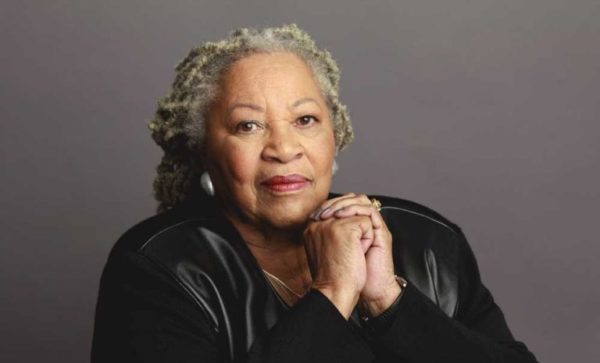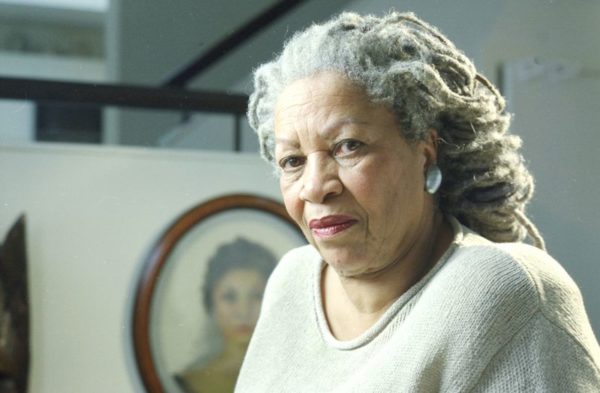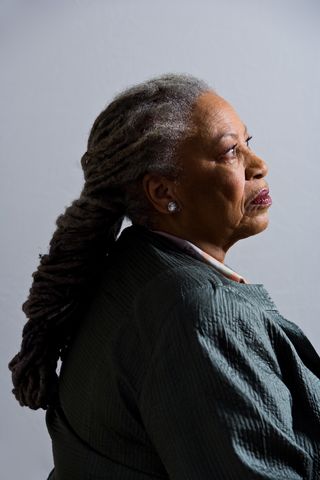
Toni Morrison, for decades the greatest living writer, passed on at 88, on 6 August. We have compiled tributes to her, published on other sites, by Namwali Serpell, Diana Evans, Bernardine Evaristo, Chigozie Obioma, Ben Okri, Aminatta Forna, Afua Hirsch, Ellah Wakatama Allfrey, Margaret Busby, Sarah Ladipo Manyika, Chimamanda Ngozi Adichie, and Laila Lalami. For some, only excerpts are shared here.
In an essay for The Guardian, Chigozie Obioma
Reflecting on her life, I feel a sense of peace because I know I have learned a lot from Morrison. On the craft level, I believed until this morning that she was the greatest living American writer (an honour Cormac McCarthy now holds), and one of the best prose stylists in the world, on the same plane as Martin Amis, Wole Soyinka, Salman Rushdie and others. She set out to do “unimaginable” things with the English language, a language she considered “at once rich and deeply racist.” Counting myself as one of many writers from former colonial states who now write in the English language, which has become our national tongue, we have had to find ways to subdue and conquer it, and bring it into submission to our cultural sensibilities. Part of that conquering is not only writing in the English language the way we desire, but also what we desire. This was exactly what Morrison did throughout her life. In a time when African stories are not seen as important unless they are set outside Africa or created to align with Western sensibilities, Morrison encouraged me to write about African traditional religion, culture and philosophies without reserve, even if the rest of the world – and even Africans themselves – see it as backward and unpleasant. I find peace because a new generation of black and African writers will continue to do just that, encouraged by the great work she has left us – and for this, I thank her.
Bernardine Evaristo, Namwali Serpell, and Diana Evans contributed to a tribute feature by the publisher Penguin, first published in February.
Bernardine Evaristo
In the eighties I was deeply inspired by the writings of African-American women writers who wrote from that perspective and gave voice to their otherwise absent, marginalised or stereotyped lives in literature. Their works validated my own ambition to write into the almost empty space of black and multicultural Britain, which I have been doing ever since. Toni Morrison was the writer I loved the most because she wrote such beautiful, powerful, evocative, complex and finely drawn psychological portraits of African-Americans, especially their women. She is a prose stylist par excellence whose language is as carefully crafted as poetry, so that almost every line of text is quotable. Her novels seem to be written from a place deep inside herself and from deep inside her culture, with an epic and mythic quality. Sadly, nearly forty years later, there is still very little literature in Britain about our lives, which is why my new novel, Girl, Woman, Other, imagines twelve different and mostly black female protagonists whose lives intersect. As much as I adore and want to celebrate Toni Morrison, we must always remember that the African-American experience is not the same as ours.
Diana Evans
Toni Morrison once said of her reasoning behind the writing of her first novel, The Bluest Eye, that nobody had ever taken a young black girl seriously before. This has always stayed with me, this desire to give voice to the dismissed, misunderstood, silenced, marginalised, persecuted and ignored, in this case her unforgettable protagonist Pecola Breedlove, whom I can still remember vividly, as I can so many of Morrison’s characters, scenes and atmospheres even years after reading them. Her work is an act of giving her community back to itself, so that people – African-Americans but the diaspora as well – can see and witness themselves, and also giving to the world the great beauty and hope that art is capable of. She is a writer whom I remain in awe of yet also feel intimately guided and encouraged by, that profound joint commitment to the folk and the craft, regardless.
Namwali Serpell
When people ask me what I do, I quote Toni Morrison: ‘I read books. I teach books. I write books. I think about books. It’s one job.’ I’ve read and taught, written and thought about Morrison’s books for most of my life. Next year, I’m teaching a course at Berkeley devoted entirely to her brilliance. I’ve analysed and tried to enact the philosophy I see in her novels: a mode of adjacency whereby people and stories and forms sit beside each other, hold hands.
But beyond that, Morrison holds me. Her writing about blackness and womanhood holds my experiences, though I was born far from Lorain, Ohio. Her voice – precise, beautiful, warm, gripping – holds me, sometimes too close, but in a way that thrills rather than threatens. And she holds me to account. She is an absolute model of integrity: uncompromising, fearless, full to the brim with everything she is.

Chimamanda Ngozi Adichie and Laila Lalami contributed to a tribute feature in The New York Times.
Laila Lalami
I came across “Beloved” in my late 20s, and felt at once awed by the book and robbed; dismayed no one had told me sooner about Toni Morrison. I sought out everything she wrote, and found innovation, inspiration, instruction. What drew me to her novels wasn’t just the depth of characters or the freshness of her language, but her unrelenting commitment to excavating the past, and interrogating it. In “Song of Solomon,” her masterpiece, she showed how history is passed down in different ways — in the official documents that those in power leave behind, and in the folktales, legends, family stories, or idle gossip that those without power must cling to. She was that rarest of combinations: a great novelist and a great intellect. She could produce, in a single year, a novel like “Jazz”; a work of literary criticism like “Playing in the Dark”; and a volume of edited essays on Anita Hill and Clarence Thomas, “Race-ing Justice, En-gendering Power.” And she did all this while teaching! There was no one like her. When I heard that she had passed away, I felt immeasurable sadness. What a loss, I thought, what a loss. But then I started considering all the lives she had touched, and changed: her readers, her contemporaries, her students, and an entire generation of writers.
Chimamanda Ngozi Adichie
Reading Ms. Morrison, you knew she gloried in the joy of language, sentence by sentence, that she dared even to invent her own syntax, and as a reader you trusted her to lead you. She was a lucid thinker in her nonfiction, curious and knowledgeable and reasonable, and in her fiction she showed a compassionate and moving familiarity with the contradictions of human beings. She was Black and she didn’t apologize for her Blackness, and she didn’t pander and she didn’t temper the painful reality of Black American history, in a country that often seemed keen to minimize it. She stared pain in the face, unblinking. She wrote about what was difficult and what was necessary and in doing so she unearthed for a generation of people a kind of redemption, a kind of relief. I loved her fiction and her essays. I adored her honesty. I admired the way she occupied her space in the world. I believed her. I met her only once, briefly, back stage at an event in honor of Chinua Achebe, and I remember her queenliness, a particular presence that came from a mix of her confidence, her gorgeous silver dreads, and her quite simply being Toni Morrison. And I remember her laughter, joyous and mischievous, a sound so free of restraint, and so uninterested in being false.
Margaret Busby, Ben Okri, Ellah Wakatama Allfrey, and Aminatta Forna contributed to a tribute feature in The Guardian.
Ben Okri
She burst into the world of literature at a time that needed her supremely wrought perspective, and was by no means the first black woman writer to have such a strong presence on the literary scene in the US. When she arrived, with her first novel, The Bluest Eye, she immediately re-ordered the American literary landscape. That voice had not existed before, those cadences cutting through the tangled slices of the American racial undergrowth, immensely fluid, capable of weaving the past and the present in a manner than was epical in compression.
In novel after novel, with heft and an electric charge, she revealed the brutalised psyche of deep-singing women, of men upon whom the appalling weight of slavery and racial dehumanisation had wrought destructive traumas. The novels discharge these traumas, blasting them out from the secret caverns of unknown lives, in a prose that is threaded and shafted with intelligence, wit, unpredictability, tough truth.
Aminatta Forna
Morrison was one of the greatest of a generation of writers who helped to shift the centre of the literary imagination. She did so in her choice of theme and character, voicing the African American experience through black protagonists, and she brilliantly subverted expectations by choosing, at times, to identify only white characters by skin colour, or erasing mention of colour from her narrative altogether. Having lived in the US for the past four years, I feel her most significant contribution is to have memorialised, through art, the history and horror of slavery in a country that has thus far failed publicly to acknowledge or to offer redress for this original sin. This task has been left to artists, specifically African American artists. Morrison’s legacy in commemorating slavery’s survivors will endure and uplift for centuries to come.
Margaret Busby
She once spoke to me of the challenges she faced as an editor having to ensure success for every black writer she took on – who included Gayl Jones, Angela Davis, Henry Dumas, and Toni Cade Bambara – lest negative assumptions be made about all black writers. Toni left publishing in 1983 so as to be able to devote more time to her own writing. After The Bluest Eye (1970), Sula (1973), Song of Solomon (1977), and Tar Baby (1981), Beloved was published in 1987 and has since been considered by many to be her breakthrough novel. However, when she came to London in 1988 for the UK publication of Beloved a television appearance that she and I had been due to make discussing publishing was dropped, ostensibly because Toni was not well enough known. Sindamani Bridglal, then a fledgling film-maker, has written about how we addressed this huge faux pas by making our own film, which we sold to Channel 4 the month Toni won the Pulitzer prize.
Ellah Wakatama Allfrey
In 2009, I was senior editor at Jonathan Cape, Random House. I loved my job – I loved my books and my authors. But sometimes it was hard. I was consumed with the desire to publish books that would tell the stories of black people in Britain, stories from Africa or from her wide and varied diaspora. And it was hard, because nowhere could I see (at that time) anyone who looked like me who wanted the same thing. A friend from New York sent me a book of postcards featuring African American writers – James Baldwin, Richard Wright, Ntozake Shange and Toni Morrison. In the image, she has an afro with gentle waves of hair, her arms spread wide as if in wonder and joy. And she was sitting at her desk where she was senior editor at Random House. The picture has moved with me from desk to desk. I looked at her and knew that I was not only possible, but necessary.

In an essay for The Guardian, Afua Hirsch
One of the most inspiring things for me about her life is that, a mother of two young children, she wrote The Bluest Eye while working full time as an editor at Random House.
As well as incubating the novels without which – as Oprah Winfrey put it – American literature as we know it would not exist, Morrison was also supporting the work of other black authors – Gayl Jones, Angela Davis and Chinua Achebe among them.
In an essay for Transition, shortlisted for the 2018 Brittle Paper Award for Creative Nonfiction, Sarah Ladipo Manyika
The first Toni Morrison book that I bought was Jazz. At the time, I
knew little about the author or her standing in the literary canon, but I was drawn to the book’s title. It sounded “real cool” to me in my “Jazz June” days, as Gwendolyn Brooks puts it. I was twenty-something, with little exposure to literary fiction and only superficial knowledge of the history of black people in America. I knew about the history of West Africa and had some textbook knowledge of the Atlantic slave trade, but no deep understanding of the scale or lived horror of slavery, and virtually nothing of the legacy of racism in America. The images I saw of America on T.V. were ones that made America look happy and prosperous. African Americans, I assumed, led lives like the Huxtables from The Cosby Show. Reading Toni Morrison was the beginning of my education on America then and now, black and white.









COMMENTS -
Reader Interactions